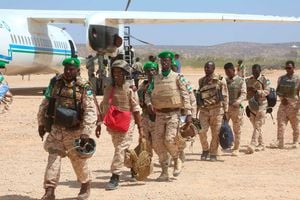
Al-Shabaab militants in Elasha Biyaha, Somalia, on February 13, 2012.
Somali President Hassan Sheikh Mohamud came to power two years ago with the intent to create a country at “peace with itself and the world.” One of the goals was to beat down the militant group al-Shabaab.
So when word went around last week that authorities were offering an olive branch to the al-Qaeda-linked group, it caused both hope and fear. Hope because it may be cheaper to upend the insecurity in Somalia without spilling more blood.
But fear because all that could change the collaboration Mohamud’s government has built between national security forces and volunteer vigilante groups eager to target a common enemy.
Dr Adam Aw Hirsi from the Mogadishu-based think-tank Foresight for Practical Solutions argued any dialogue offer to Shabaabs could place the government’s stance against militants into question.
“First and foremost, the mere suggestion of engaging in discussions with a group responsible for numerous bloody atrocities and heinous violence, with which some Somali clans swore to fight to the last man, raises significant moral and ethical questions,” Dr Aw Hirsi told The EastAfrican.
As part of the campaign against al-Shabaab, Mohamud even labelled al-Shabaab as outcasts, choosing to describe their brand of Islam as deviant. Many people bought the strategy to depict the group as not representative of Somali youth.
“The Somali communities who have borne the brunt of al-Shabaab’s terror may feel betrayed and confused by the prospect of Somali government conducting secretive and unilateral dialogue with their sworn enemies,” Aw Hirsi argued on Monday, July 1.
Except now the government says no such talks will take place, as long as the militants keep carrying arms and launching ambush attacks.
At the ceremony to commemorate Independence Day on July 1, President Hassan Sheikh Mohamud dismissed “misleading information” on the war on al-Shabaab.
“There is no single issue that we can discuss with Al-Shabaab. This is contrary to what has recently been circulating in the social media,” he told an audience in Mogadishu.
But he didn’t entirely shut the door on dialogue. According to him, the government may hold discussions with the group on two conditions:
• If foreign fighters get out of Somalia
• If local fighters surrender and show a willingness to rejoin their communities
“Let me say that many had deserted the extremist group, abandoned the idea and are now serving their nation in various capacities, security and civil service, some reaching high ranks.
“We can only negotiate with Al-Shabaab if there are commonalities and we only differ on how to do things, ‘I prefer this and I prefer that’, kind of thing.”
Although Somalia has developed a full-blown war on al-Shabaab, it has also pursued a behaviour-change mindset; asking banks and financial institutions in general to freeze funding channels, asking the diaspora to stop sending money to fighters and asking villagers to out sympathisers of al-Shabaab. Those who change their ways have been rewarded.
Somali Prime Minister Hamza Barre, for instance, named Mukhtar Rubow, a former Shabaab spokesman as Minister for Religious Affairs. However, Rubow had quit the militant group six years ago in search of a formal political career.
The rumour about talks with al-Shabaab didn’t start today but no one had ever verified claims, although the grapevine suggested some countries friendly to Somalia had suggested this route because military means won’t defeat an ideology.
In late June, President Hassan Sheikh Mohamud travelled to Norway, where he spoke at the Oslo Forum, a yearly gathering of leaders, conflict mediators, and other actors.
The theme was “Mediation Against All Odds.”
“The President touched on the government’s commitment to pursuing peaceful means to reduce extremist violence, including initiating political engagements and providing amnesty to members who denounce extremist ideology. He further noted that “the terrorists’ global agenda complicates these efforts,” said a dispatch from Villa Somalia, his official residence in Mogadishu.
During Mohamud’s tour in the Nordic country, he spoke at various venues including one in which Qatar’s state minister for foreign affairs Mohamed Bin Abdul Aziz Al Khulaifi was a panel member.
Al Khulaifi responded to an enquiry about possible mediation “(being) a Somalia’s internal security matters and this is where international stakeholders can add value by helping, assessing and enhancing those aspects together.
“I strongly believe more international cooperation in dealing, specifically in the case of Somalia, will assist and bring more peace and stability in this area.”
Al Khulaifi’s remarks prompted inquiries about the Gulf State’s ability to lure the Federal Government of Somalia and Al-Shabaab to peace talks.
Mohamud’s trip to Norway was met with multiple criticisms as many saw participation in a forum focusing on dialogue being a signal of his readiness to talk with the enemy.
Abdurahman Abdishakur, a local legislator and a former presidential candidate in 2022, suggested such dialogue should be a careful step.
“The talks that are said to be held with the Al-Shabaab terrorist group should not be an arbitrary decision. It should be approached through an inclusive national consultation, and the public should be informed transparently,” Abdishakur said.
Somali government officials have since rejected the grapevine. National Security Adviser Hussein Sheikh-Ali said that President Mohamud has put in place unblemished conditions for any potential negotiations.
“They must cut any links with global terror groups and accept Somalia’s territorial integrity. They must be prepared to peacefully pursue their political agenda,” Sheikh-Ali stated.
On Saturday, speaking at the inauguration of Somaliland’s new museum built in Hargeisa, President Muse Bihi of the breakaway region of Somaliland, claimed Mogadishu is negotiating with Al-Shabaab to create an alliance that will target his region.
It is not the first time Somaliland authority has suggested facing an alliance that includes al-Shabaab.
A clan militia forced Somaliland troops from Las Anod town, Sool region, about 1200 northeast of Mogadishu, in August 2023. They then established SSC-Khatumo administration which has since been endorsed by Mogadishu as a region directly administered by the Federal Government of Somalia. Somaliland which protested the move claims the militia were aided by Shabaabs, which the clans rejected.
Many experts reckon that with Al-Shabaab now plagued by internal rifts, more radical elements within the group oppose any such negotiations.
Prime Minister Hamza Barre had earlier declared his government’s inclination to initiate peace talks with Al-Shabaab in February this year.
“I express our willingness to negotiate if the group renounces violence,” Barre had stated.
Known formally as Harakat Al-Shabaab Al-Mujahideen (Youth Jihadist Movement), the militants have been fighting for nearly two decades to destroy the Federal Government of Somalia (FGS) and rid the country of foreign forces that are assisting the FGS and rule the country by strict Islamic rule.
Now Somalia must stabilise its security forces as the African Union Transition Mission (ATMIS) in Somalia prepare to leave Somalia later this year. Somalia and neighbouring countries had agreed on a post-ATMIS force but finer details including mandate are yet to be ironed out.
Additional reporting by Aggrey Mutambo







